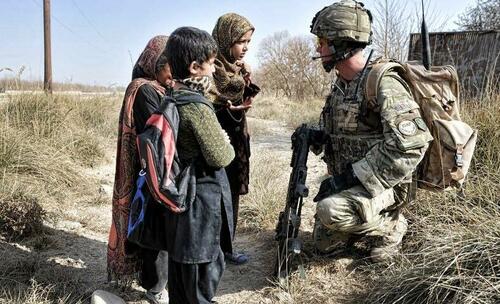
Authored by Erica Moshtahedian via RealClearPolitics.com,
For those of us who came of age in the aftermath of September 11 and the wars that followed, a new book “River City One” by first-time author John Waters provides a reprieve from glamorized, military-style leadership guides like “Extreme Ownership” or “Make Your Bed,” or adrenaline-filled memoirs like Navy SEAL Chris Kyle’s “American Sniper.”
This is a penetration into the mind of a veteran returned to the world that we share with him.
A Naval Academy graduate and a veteran of Iraq and Afghanistan, Waters is now an attorney in Omaha, his hometown. “River City One” is a novel, not a memoir, albeit a palpably autobiographical account. (In the interest of disclosure, after leaving military service as a U.S. Marine Corps captain, Waters was co-editor of RealClearDefense; Carl Cannon, executive editor of RealClearMedia, wrote the foreword to this book).
The story’s protagonist, war hero John Walker, shares with the reader an inner dialogue influenced by his drug-like withdrawal from the adrenaline and purpose of battle into the mundaneness of everyday life. He is an imperfect protagonist. Walker shares more with the self-doubting characters found in the novels from Lost Generation authors than the depictions of modern war heroes likely to be adapted by Hollywood.
In Walker, we are introduced to a character who, like Ford Madox Ford’s character Christopher Tietjens in “Parade’s End,” is not immediately likable and somewhat aloof. Unlike Tietjens, Walker doesn’t inform us of his life philosophy. Instead, we know only of his opinions through his critique of others. Clients, colleagues, fellow veterans, and family are not spared. He regularly dismisses the accomplishments of others as having little meaning. He thinks of civilians who want to ask him questions about his service as “turned on” by war stories. He asserts that his family occupies a separate world apart from him, as if he is unimportant to their well-being. We come to understand that his opinions are partial truths, informed by shame, used to justify his avoidance of family intimacy.
Even as a civilian, Walker has remained fit enough to drop and rhythmically knock out pushups. He must be sufficiently handsome and masculine to coast at his job as a lawyer, putting less effort into his work and appearance than his colleagues. Had Walker’s physicality been defined up front and the character described as having a more amiable disposition, he would register as a heartthrob, like Milan Kundera’s Tomas in “The Unbearable Lightness of Being.” Instead, the author avoids allowing his protagonist either to be put on a pedestal or seen as a cad, ensuring that his dalliance with an aging, auburn-haired singer named Ruth is not regarded as part of a pattern. Instead, it registers as an act of despair, a final gasp for life.
We instead relate to Walker by accepting that his internal dialogue (like our own) can be wildly detached from what he says or does or how others perceive him. He is thus simultaneously unlikable and sympathetic. Who among us has only benevolent thoughts? As the story unfolds, it becomes clear that Walker’s private criticism of others reflects more than passing internal commentary but rather his inability to find purpose. His inner dialogue transforms into the cause of the unfolding drama. Ultimately, his fixations lead to an existential crisis.
Unlike “Parade’s End,” Waters’s novel features no evil force or character challenging the protagonist. Walker’s wife epitomizes the modern supportive partner, even as Walker goads her by sharing his interest in meeting Ruth, the exotic and alluring opera singer, who is introduced halfway through the novel. Moreover, despite his lack of ambition in his peacetime profession, his colleagues and superiors do their best to include, mentor, and elevate him.
Walker does not want for opportunity. The schism between his self-image and how others perceive him is internal. Ironically, Ruth doesn’t suffer this same internal conflict. She is an archetype of a sophisticated and attractive woman who, in the abstract, could “understand” him. At any moment, Walker could choose to make his life about the future and move on from the past. He could decide to reconnect with his wife and son.
“River City One” is a stimulating read because it addresses how such a fractured sense of self can lead to all-consuming nihilistic thoughts.
Walker may be handsome, educated, employed, and loved – but he is unable to reciprocate in relationships or to recognize PTSD in himself and the deep shame he feels from the loss of a friend during the war.
Does his predicament represent the quiet despair and numbness that thousands of our veterans feel when they return to their own River Cities?
Waters illustrates that a downward spiral can occur inside a man’s head, even if life appears to move forward.
Walker supplies a subtle reminder – especially to those of us with friends, family, or peers who are combat veterans of Afghanistan or Iraq – that one never knows what is going on in someone else’s head. Neither talent nor opportunity spares veterans from the loss of purpose they may experience when returning home from war.
Many American families wish that they knew how to get someone in this position to snap out of it. “River City One” does not offer a remedy but simply a glimpse inside the mind of someone whose life and self-image were shattered by war. The novel’s lesson broadly applies to veterans and civilians alike: our lives are the sum of our choices. At every stage, we can choose to embrace family and make better decisions for ourselves and the people who care for us. The author leaves open the possibility of redemption for his protagonist. There is always hope. Perhaps Waters is a “Make Your Bed” guy, after all.
Authored by Erica Moshtahedian via RealClearPolitics.com,
For those of us who came of age in the aftermath of September 11 and the wars that followed, a new book “River City One” by first-time author John Waters provides a reprieve from glamorized, military-style leadership guides like “Extreme Ownership” or “Make Your Bed,” or adrenaline-filled memoirs like Navy SEAL Chris Kyle’s “American Sniper.”
This is a penetration into the mind of a veteran returned to the world that we share with him.
A Naval Academy graduate and a veteran of Iraq and Afghanistan, Waters is now an attorney in Omaha, his hometown. “River City One” is a novel, not a memoir, albeit a palpably autobiographical account. (In the interest of disclosure, after leaving military service as a U.S. Marine Corps captain, Waters was co-editor of RealClearDefense; Carl Cannon, executive editor of RealClearMedia, wrote the foreword to this book).
The story’s protagonist, war hero John Walker, shares with the reader an inner dialogue influenced by his drug-like withdrawal from the adrenaline and purpose of battle into the mundaneness of everyday life. He is an imperfect protagonist. Walker shares more with the self-doubting characters found in the novels from Lost Generation authors than the depictions of modern war heroes likely to be adapted by Hollywood.
In Walker, we are introduced to a character who, like Ford Madox Ford’s character Christopher Tietjens in “Parade’s End,” is not immediately likable and somewhat aloof. Unlike Tietjens, Walker doesn’t inform us of his life philosophy. Instead, we know only of his opinions through his critique of others. Clients, colleagues, fellow veterans, and family are not spared. He regularly dismisses the accomplishments of others as having little meaning. He thinks of civilians who want to ask him questions about his service as “turned on” by war stories. He asserts that his family occupies a separate world apart from him, as if he is unimportant to their well-being. We come to understand that his opinions are partial truths, informed by shame, used to justify his avoidance of family intimacy.
Even as a civilian, Walker has remained fit enough to drop and rhythmically knock out pushups. He must be sufficiently handsome and masculine to coast at his job as a lawyer, putting less effort into his work and appearance than his colleagues. Had Walker’s physicality been defined up front and the character described as having a more amiable disposition, he would register as a heartthrob, like Milan Kundera’s Tomas in “The Unbearable Lightness of Being.” Instead, the author avoids allowing his protagonist either to be put on a pedestal or seen as a cad, ensuring that his dalliance with an aging, auburn-haired singer named Ruth is not regarded as part of a pattern. Instead, it registers as an act of despair, a final gasp for life.
We instead relate to Walker by accepting that his internal dialogue (like our own) can be wildly detached from what he says or does or how others perceive him. He is thus simultaneously unlikable and sympathetic. Who among us has only benevolent thoughts? As the story unfolds, it becomes clear that Walker’s private criticism of others reflects more than passing internal commentary but rather his inability to find purpose. His inner dialogue transforms into the cause of the unfolding drama. Ultimately, his fixations lead to an existential crisis.
Unlike “Parade’s End,” Waters’s novel features no evil force or character challenging the protagonist. Walker’s wife epitomizes the modern supportive partner, even as Walker goads her by sharing his interest in meeting Ruth, the exotic and alluring opera singer, who is introduced halfway through the novel. Moreover, despite his lack of ambition in his peacetime profession, his colleagues and superiors do their best to include, mentor, and elevate him.
Walker does not want for opportunity. The schism between his self-image and how others perceive him is internal. Ironically, Ruth doesn’t suffer this same internal conflict. She is an archetype of a sophisticated and attractive woman who, in the abstract, could “understand” him. At any moment, Walker could choose to make his life about the future and move on from the past. He could decide to reconnect with his wife and son.
“River City One” is a stimulating read because it addresses how such a fractured sense of self can lead to all-consuming nihilistic thoughts.
Walker may be handsome, educated, employed, and loved – but he is unable to reciprocate in relationships or to recognize PTSD in himself and the deep shame he feels from the loss of a friend during the war.
Does his predicament represent the quiet despair and numbness that thousands of our veterans feel when they return to their own River Cities?
Waters illustrates that a downward spiral can occur inside a man’s head, even if life appears to move forward.
Walker supplies a subtle reminder – especially to those of us with friends, family, or peers who are combat veterans of Afghanistan or Iraq – that one never knows what is going on in someone else’s head. Neither talent nor opportunity spares veterans from the loss of purpose they may experience when returning home from war.
Many American families wish that they knew how to get someone in this position to snap out of it. “River City One” does not offer a remedy but simply a glimpse inside the mind of someone whose life and self-image were shattered by war. The novel’s lesson broadly applies to veterans and civilians alike: our lives are the sum of our choices. At every stage, we can choose to embrace family and make better decisions for ourselves and the people who care for us. The author leaves open the possibility of redemption for his protagonist. There is always hope. Perhaps Waters is a “Make Your Bed” guy, after all.
Loading…






